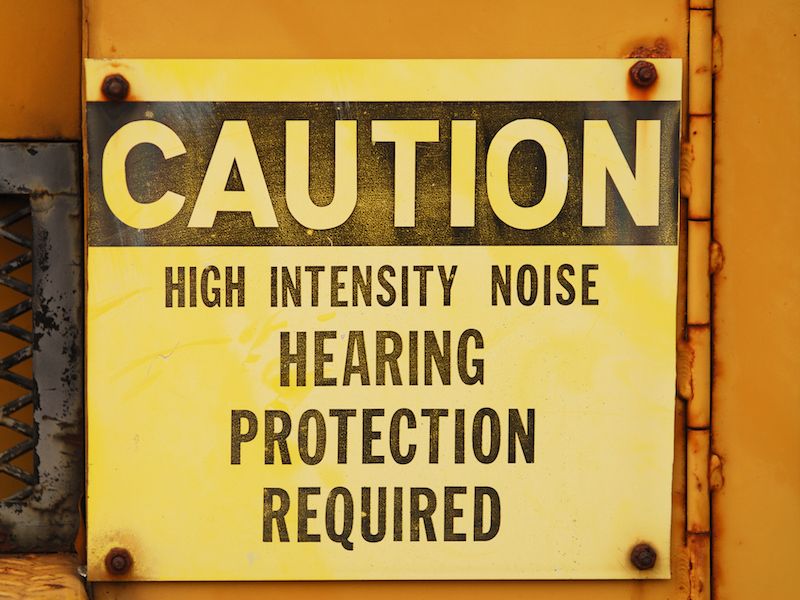
Understanding you should protect your ears is one thing. Knowing when to safeguard your ears is a different story. It’s not as simple as, for example, determining when to use sunblock. (Are you going outside? Is there sunlight? You should be using sunscreen.) It’s not even as simple as knowing when to wear eye protection (Working with hazardous chemicals? Doing some construction? You need eye protection).
When it comes to when to wear hearing protection, there seems to be a large grey area which can be dangerous. Frequently, we’ll defer to our natural tendency to avoid hearing protection unless we have information that a particular place or activity is hazardous.
Risk Assessments
In general, we’re not very good at assessing risk, especially when it comes to something as intangible as lasting hearing problems or loss of hearing. To prove the point, here are some examples:
- Person A goes to a very loud rock concert. 3 hours is approximately the length of the concert.
- Person B owns a landscaping company. After mowing lawns all day, she goes home and quietly reads a book.
- Person C is an office worker.
You may believe the hearing danger is greater for person A (let’s just call her Ann). Ann leaves the performance with her ears ringing, and she’ll spend most of the next day, trying to hear herself speak. It seems reasonable to presume that Ann’s recreation was rather hazardous.
Person B (let’s call her Betty), on the other hand, is exposed to less noise. There’s no ringing in her ears. So it must be less hazardous for her ears, right? Not really. Because Betty is mowing all day. The truth is, the damage accumulates a little at a time even though they don’t ring out. If experienced on a regular basis, even moderately loud noises can have a detrimental affect on your hearing.
Person C (let’s call her Chris) is even less evident. Most individuals understand that you need to safeguard your hearing while running machines such as a lawnmower. But even though Chris works in a quiet office, she has a very noisy, hour-long commute each day on the train. What’s more, she sits at her desk and listens to music through earbuds. Does she need to consider protection?
When You Should Think About Protecting Your Hearing
Normally, you should turn down the volume if you have to raise your voice to be heard. And if your surroundings are that noisy, you really should think about wearing earplugs or earmuffs.
If you want to think about this a bit more scientifically, you need to use 85dB as your cutoff. Noises above 85dB have the potential, over time, to cause damage, so you need to give consideration to using hearing protection in those scenarios.
Many hearing professionals advise getting a specialized app to monitor decibel levels so you will be aware when the 85dB has been reached. These apps can show you when the ambient sound is nearing a harmful level, and you can take suitable steps.
A Few Examples
Your phone may not be with you anywhere you go even if you do download the app. So a few examples of when to protect your ears might help you formulate a good baseline. Here we go:
- Working With Power Tools: You recognize that working all day at your factory job will necessitate hearing protection. But how about the hobbyist building in his garage? Even if it’s just a hobby, hearing specialists suggest using hearing protection if you’re operating power equipment.
- Household Chores: We already talked about how something as basic as mowing the lawn, when done frequently, can call for hearing protection. Chores, including mowing, are most likely something you don’t even think about, but they can result in hearing damage.
- Exercise: You know your morning cycling class? Or maybe your nighttime workout session? You might consider wearing hearing protection to each one. The high volume from instructors who play loud music and microphones for motivation, though it might be good for your heart rate, can be bad for your hearing.
- Listening to music with earbuds. This one requires caution, more than protection. Pay attention to how loud the music is, how long you’re listening to it, and whether it’s playing directly into your ears. Think about using headphones that cancel out outside sound so you don’t have to crank up the volume to dangerous levels.
- Commuting and Driving: Do you drive for Lyft or Uber? Or maybe you’re just waiting downtown for work or boarding the subway. The noise of living in the city is bad enough for your hearing, not to mention the added injury caused by cranking up your tunes to drown out the city noise.
These illustrations might give you a suitable baseline. When in doubt, however, you should defer to protection. Compared to leaving your ears exposed to future damage, in most situations, it’s better to protect your hearing. Protect today, hear tomorrow.
